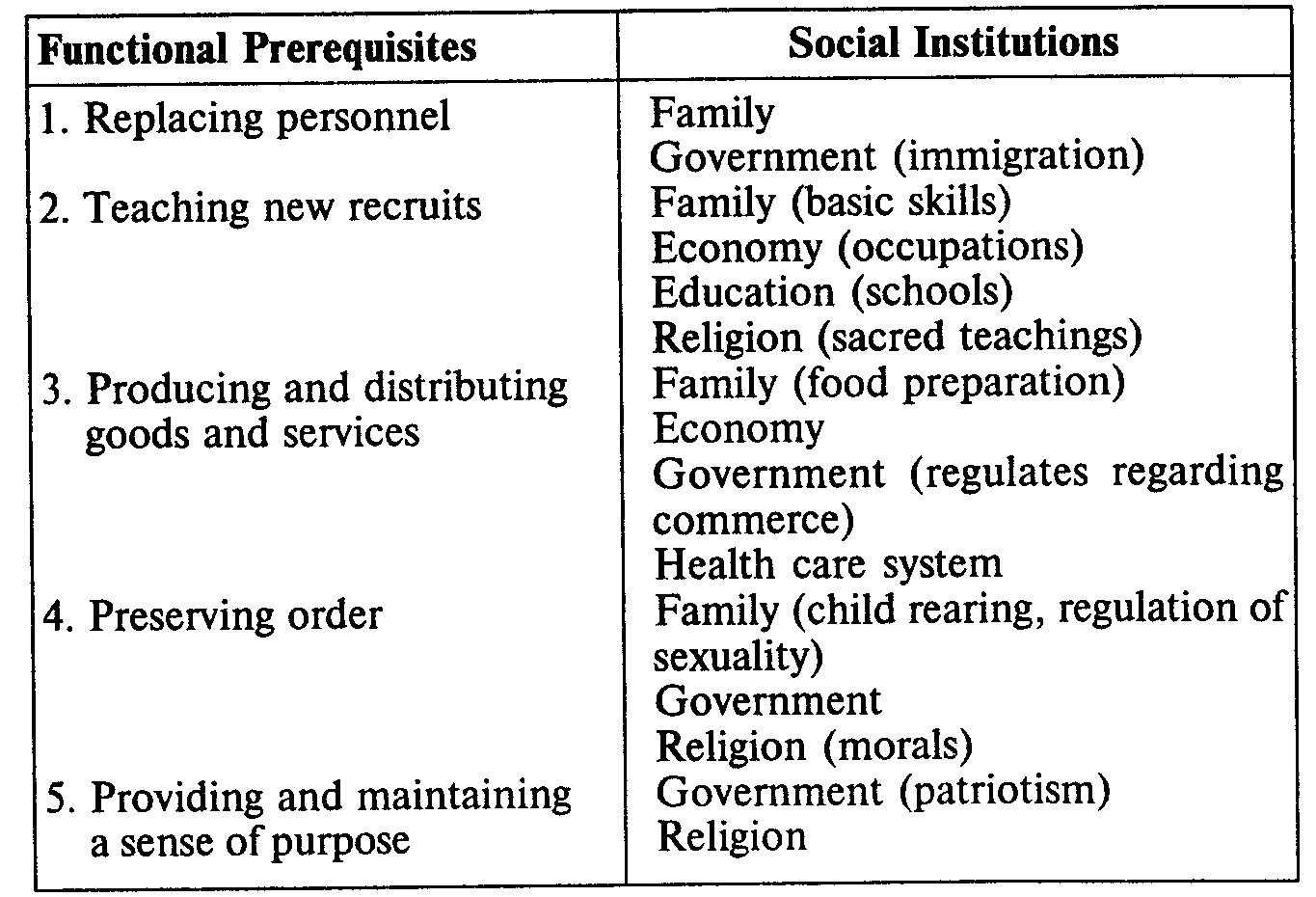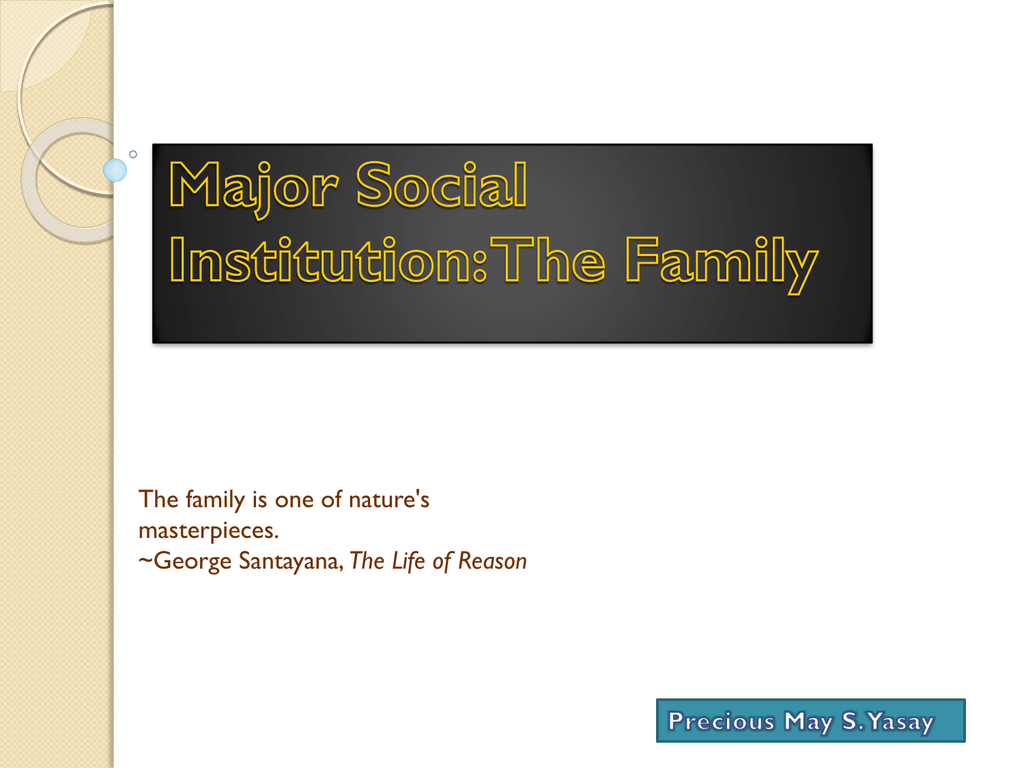Have you ever stopped to think about the intricate network of structures that shape our daily lives? From the moment we wake up to the time we drift off to sleep, we are constantly interacting with social institutions that govern our behavior, shape our values, and determine our access to resources. These institutions, ranging from the family to the government, are the very fabric of society, woven together to form the complex tapestry of human existence.

Image: cloudshareinfo.blogspot.com
This article will explore the concept of major social institutions, delving into their history, basic functions, and impact on individuals and communities. We’ll examine the different types of institutions, their evolving roles in the modern world, and the challenges they face as humanity navigates an increasingly interconnected and dynamic global landscape. Understanding these institutions is crucial for comprehending the social forces that shape our lives and participating meaningfully in the shaping of our collective future.
Defining Social Institutions: The Building Blocks of Society
Social institutions are established patterns of behavior and social structures that organize individuals into predictable relationships. These institutions create a framework for social order, providing guidelines for behavior and shaping our perceptions of the world. They fulfill essential functions that are vital for the survival and well-being of society, such as:
- Socialization: Institutions are responsible for teaching individuals the norms, values, and beliefs of their culture. This process of socialization begins in childhood within families and continues throughout life through institutions like schools, religious organizations, and workplaces.
- Regulation: Institutions set boundaries and establish rules that govern individual behavior, ensuring stability and predictability within society. These rules can be formal, such as laws and regulations, or informal, like customs and traditions.
- Resource Allocation: Institutions play a significant role in determining how resources are distributed within society. This includes access to education, healthcare, economic opportunities, and political power.
- Social Control: Institutions work to maintain order and discourage deviant behavior through mechanisms like sanctions, rewards, and social pressure.
The Major Social Institutions: A Framework for Understanding Society
While numerous institutions exist, some stand out as pivotal forces in shaping human experience. These include:
1. The Family: The Foundational Institution
The family, often considered the most fundamental social institution, is the primary unit of socialization. It serves as the first and often most influential environment for learning social norms, developing values, and building personal identity. Family structures vary greatly across cultures and time periods, encompassing nuclear families, extended families, single-parent households, and blended families.
Key Functions of the Family:
- Reproduction: Passing on cultural knowledge and values through generations.
- Emotional Support: Providing love, care, and security for members.
- Socialization: Teaching children the basic skills and knowledge needed for life in society.
- Economic Support: Providing for the material needs of its members.
Challenges Facing the Family:
- Changing Family Structures: Divorce rates, single-parent households, and same-sex couples are altering traditional family models.
- Work-Life Balance: Increasing demands on parents from work and other commitments are placing a strain on family time.
- Technological Advancements: Social media and other technologies are affecting family dynamics and communication.

Image: studylib.net
2. Education: The Gateway to Knowledge and Opportunity
Education, a cornerstone of modern societies, plays a critical role in transmitting knowledge, fostering critical thinking, and preparing individuals for the workforce. Schools, universities, and other educational institutions are essential for equipping individuals with skills and knowledge that enable them to participate actively in society.
Key Functions of Education:
- Cognitive Development: Enhancing cognitive abilities such as memory, problem-solving, and critical thinking.
- Skills Acquisition: Teaching vocational, technical, and academic skills needed for the workplace and civic engagement.
- Socialization: Cultivating social skills, promoting tolerance, and fostering cooperation.
- Cultural Transmission: Passing down cultural knowledge, traditions, and values.
Challenges Facing Education:
- Inequality: Access to quality education varies widely, perpetuating social inequalities.
- Technological Disruption: The rise of online learning and digital technologies is changing the landscape of education.
- Funding Shortages: Financial constraints are impacting resources and teacher quality in many educational institutions.
3. Religion: Providing Meaning and Moral Guidance
Religion has been a defining feature of human societies for millennia, offering a framework for understanding the universe, shaping moral values, and providing solace during life’s uncertainties. Religious institutions, such as churches, mosques, temples, and synagogues, serve as centers for worship, community gatherings, and spiritual guidance.
Key Functions of Religion:
- Meaning and Purpose: Offering explanations for life’s mysteries and providing a sense of purpose.
- Moral Code: Setting ethical guidelines for behavior and promoting social cohesion.
- Community Building: Fostering a sense of belonging and shared values among followers.
- Social Control: Encouraging conformity to religious norms and discouraging deviant behavior.
Challenges Facing Religion:
- Secularization: The decline in religious observance and influence in modern societies.
- Interfaith Conflict: Tensions and conflicts arising from differences in religious beliefs and practices.
- Religious Extremism: The rise of radical ideologies that promote intolerance and violence.
4. The Economy: The Engine of Production and Consumption
The economy encompasses the production, distribution, and consumption of goods and services within a society. Economic institutions, including banks, businesses, corporations, and labor unions, play a vital role in organizing economic activity and fostering economic growth.
Key Functions of the Economy:
- Production: Creating goods and services to meet the needs and wants of society.
- Distribution: Allocating goods and services to consumers through various means, like markets and government programs.
- Consumption: Utilizing goods and services to satisfy individual and societal needs.
- Job Creation: Providing employment opportunities that contribute to economic growth and individual well-being.
Challenges Facing the Economy:
- Global Economic Inequality: Disparities in wealth and income between countries and within societies.
- Climate Change: The impact of climate change on economic sectors and resource availability.
- Technological Unemployment: The displacement of workers by automation and artificial intelligence.
5. The Government: The Framework for Law and Order
Government, the institution that holds the authority to make and enforce laws, plays a crucial role in maintaining social order, protecting individual rights, and providing essential public services. The state, through its various branches and agencies, oversees a wide range of functions including:
Key Functions of the Government:
- Law Enforcement: Maintaining law and order, protecting citizens from harm, and enforcing legal codes.
- Public Services: Providing essential services like healthcare, education, infrastructure, and social welfare programs.
- Economic Regulation: Setting policies aimed at promoting economic growth and stability, managing inflation, and regulating markets.
- National Defense: Protecting the country from external threats and ensuring national security.
Challenges Facing the Government:
- Political Polarization: Increasing division and tension between political ideologies.
- Corruption: Abuse of power and misuse of public resources for personal gain.
- Ineffectiveness: Inability of governments to address pressing social issues and respond effectively to crises.
6. The Media: Shaping Public Opinion and Disrupting Power Structures
The media, encompassing newspapers, television, radio, social media, and online platforms, plays a vital role in shaping public opinion, disseminating information, and holding institutions accountable. The media’s influence is vast and far-reaching, with the potential to both empower and manipulate the masses.
Key Functions of the Media:
- Information Dissemination: Providing news, entertainment, and educational content to the public.
- Public Discourse: Facilitating public debate and providing a platform for diverse perspectives.
- Social Commentary: Critiquing social norms, exposing injustices, and raising awareness of important issues.
- Political Influence: Shaping political agendas, influencing elections, and holding leaders accountable.
Challenges Facing the Media:
- Fake News: The proliferation of misinformation and disinformation online.
- Media Concentration: The consolidation of media ownership into the hands of a few powerful entities.
- Social Media Addiction: The impact of social media on mental health and the spread of negativity.
Major Social Institutions
https://youtube.com/watch?v=38WUnQl01RY
Conclusion: Navigating the Interconnectedness of Social Institutions
The major social institutions are crucial for the functioning of any society, shaping our lives, values, and interactions. Understanding their history, functions, and challenges is vital for engaging meaningfully in the public sphere, promoting social justice, and contributing to a more equitable and sustainable future. As these institutions continue to evolve in response to technological advancements, global interconnectedness, and shifting social norms, it becomes increasingly important to critically examine their roles and promote responsible, ethical, and equitable practices within them.
This article has provided a glimpse into the complex world of major social institutions. To further deepen your understanding, explore resources from reputable academic institutions, government agencies, and non-profit organizations. Engage in constructive dialogue with others, challenge assumptions, and work together to build a society that values justice, equality, and sustainability.






